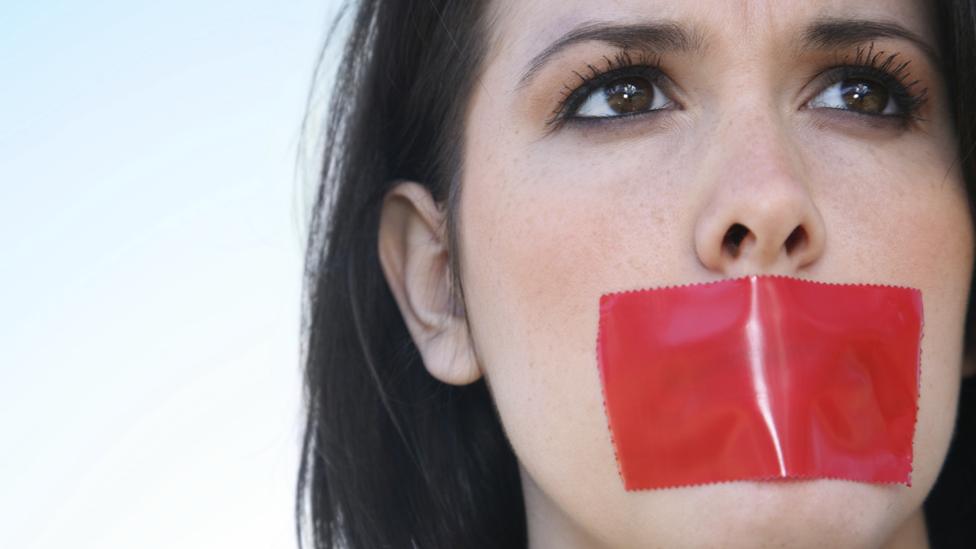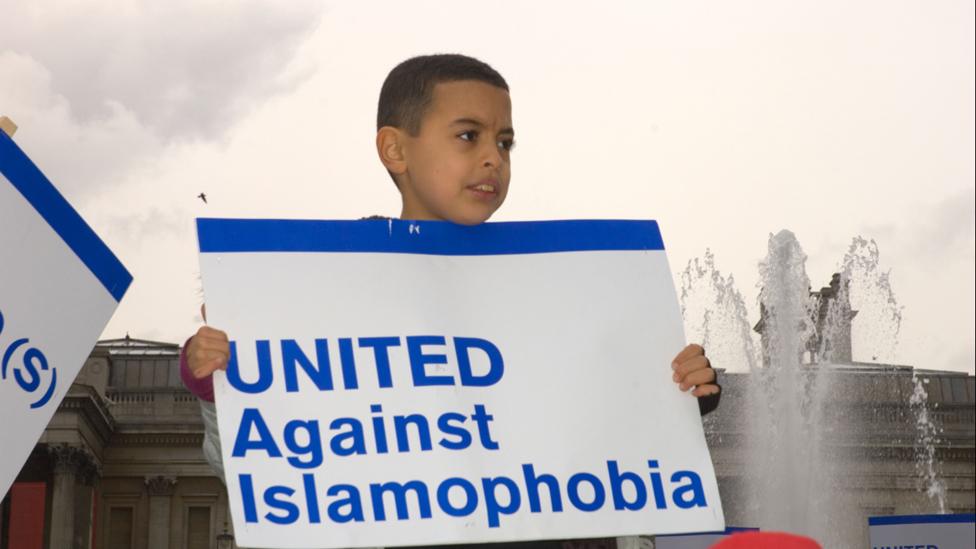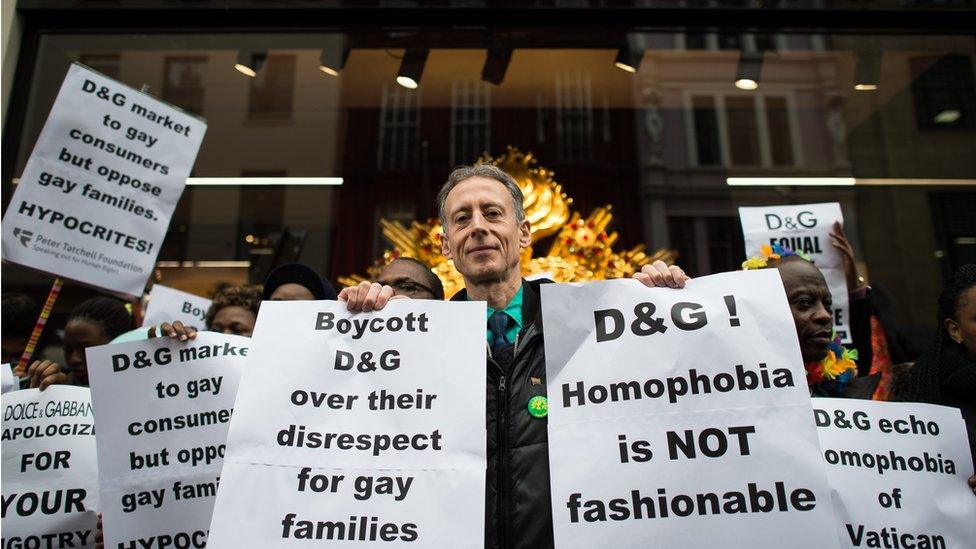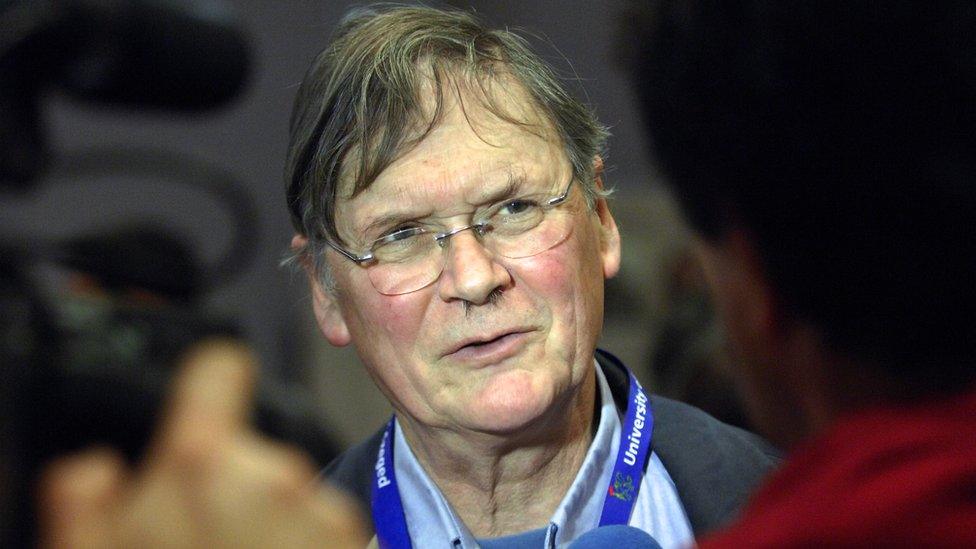A Point of View: Why we should defend the right to be offensive
- Published

Free speech can make for uncomfortable listening, argues Roger Scruton, but it needs to be defended even when it gives offence.
To people like me, educated in post-war Britain, free speech has been a firm premise of the British way of life. As John Stuart Mill expressed the point:
"The peculiar evil of silencing the expression of an opinion is, that it is robbing the human race; posterity as well as the existing generation; those who dissent from the opinion, still more than those who hold it. If the opinion is right, they are deprived of the opportunity of exchanging error for truth: if wrong, they lose, what is almost as great a benefit, the clearer perception and livelier impression of truth, produced by its collision with error."
That famous statement is not the last word on the question, but it is the first word and was, during my youth, the received opinion of all educated people. The law, we believed, would protect the heretics, the dissidents and the doubters against any punishments devised to intimidate or silence them, for the very reason that truth and argument are sacred, and must be protected from those who seek to suppress them.
Moreover, public opinion was entirely on the side of the law, ready to shame those who assumed the right to silence their opponents, whatever the matter under discussion, and however extreme or absurd the views expressed.
All that is now changing. Under the Racial and Religious Hatred Act 2006, it is an offence to stir up hatred towards religious and racial groups. "Stirring up hatred" is an expression both loaded and undefined. Do I stir up hatred towards a religious group by criticising its beliefs in outspoken terms? Under the terms of the act, I would have to use "threatening words and behaviour" and also intend to stir up hatred.
But is giving offence a reason to convict someone of a crime? The robust English view used to be that the correct response to offensive words is to ignore them, or to answer them with a rebuke. If you invoke the law at all, it should be to protect the one who gives the offence, and not the one who takes it. Now, it seems, it is all the other way round.

A 2006 protest in London against Islamophobia
At the time of the attacks on the twin towers, many expressed their shock at the gratuitous murder of 3,000 innocent people, blaming doctrinal Islam for the perversion of the criminals responsible. Immediately a new word entered the public discourse - Islamophobia.
The religious fanaticism of those who had flown into the twin towers and the so-called Islamophobia of their critics were both represented as crimes, hardly distinguishable in their destructiveness. The main purpose of future policy, it was implied, must be to ensure that neither crime is committed again. Pressure mounted to forbid Islamophobia by law - and in its way that is what the Racial and Religious Hatred Act has tried to do.
Ed Miliband promised last April that a future Labour government would make Islamophobia into an aggravated criminal offence, and meanwhile the consequences for a civil servant, a policeman or a teacher of being accused of this fault are serious in the extreme.
This takes us back to what John Stuart Mill had in mind. It is not falsehood that causes the greatest offence, but truth. You can endure insults and abuse when you know them to be false. But if the remarks that offend you are true, their truth becomes a dagger in the soul - you cry "lies!" at the top of your voice, and know that you must silence the one who utters them.
That is what has happened in the case of Islamophobia. Muslims in our society are often victims of prejudice, abuse and assault, and this is a distressing situation that the law strives to remedy. But when people invent a phobia to explain all criticism of Islam it is not that kind of abuse that they have in mind. They wish to hide the truth, to shout "lies!" in the face of criticism and to silence any attempt at discussion. In my view, however, it is time to bring the truth into the open, including the truth about the Holy Book itself.
The classical Islamic philosophers, the early jurists and the Sufi poets all tried to interpret the Koran so that it would be compatible with life in the real world. But their efforts were increasingly disapproved of, and now it is widely held among orthodox Sunnis that interpretation is no longer permitted - or, as the saying goes, "the gate of ijtihad is closed".
None of the real difficulties are to be discussed. And yet it is just now, in Islam's encounter with Western democracy, that discussion is most needed. Muslims must adapt, just as we all must adapt, to the changed circumstances in which we live. And we adapt by putting things in question, by asking whether this or that belief is true or binding, and in general by opening our hearts to other people's arguments and attempting to meet them with arguments of our own.
Free speech is not the cause of the tensions that are growing around us, but the only possible solution to them. If the government is to succeed in its new measures to eradicate Islamic extremism, therefore, it should be encouraging people to discuss the matter openly, regardless of who might take offence.

London 2015: Gay rights activist Peter Tatchell leads protest against Dolce & Gabbana after its founders criticised the idea of gay families
In 2008 it also became a crime to stir up hatred against groups defined by their sexual orientation. The orthodox liberal view is that homosexuality is innate and guiltless. Like the Islamists, the advocates of this view have invented a phobia with which to denounce their opponents. Deviate in the smallest matter from the orthodoxy, and you will be accused of homophobia and, although this is not yet a crime, it is accompanied, especially for those with any kind of public office, by real social costs.
The fear of accusation, of standing aside from the crowd, of not being impeccably on the side of the received opinion, explains much of the legislation attacking free speech in this country. Politicians have not sufficiently examined what they meant by "stirring up hatred". They have been too keen to show that they are on the side of Muslims and also of homosexuals notwithstanding the manifest conflict between the two.
It is precisely for this reason that they should have been careful about introducing vague phrases that could be used to silence discussion. We may disapprove of the view that homosexuality is a sin, but it does not follow that the street preachers who have recently been arrested for saying so are stirring up hatred. However misguided their opinion might be, it is a legitimate contribution to a much-needed public debate - a debate that will not now occur, so fierce is the condemnation of those who deviate from the one permitted opinion.
What, then, should be the role of the law in policing the forum of public debate? It seems to me that it should not criminalise opinions that give offence, but protect those who express them. In the age of the internet, the Twitter crowd and social media, however, it is increasingly difficult for the law to intervene - abuse and persecution rapidly become widespread and anonymous, avoiding all punishment and blame.
A recent example illustrates what I mean. In the course of a scientific conference in Korea, Professor Sir Tim Hunt, the Nobel-prize winning biologist, said that when "girls" were present in a research laboratory "you fall in love with them, they fall in love with you, and when you criticise them they cry".
As a result of the ensuing witch-hunt, Sir Tim was forced to resign from his professorship at University College London, the Royal Society (of which he is a fellow) went public with a denunciation, and he was pushed aside by the scientific community. A lifetime of distinguished creative work has ended in ruin.

The biochemist Sir Tim Hunt was forced to resign from a professorship after allegedly sexist remarks
The orthodox view today is that sex is in every respect irrelevant to the pursuit of a scientific career. I don't know whether that view is true, though I doubt that it is, and clearly Sir Tim does not entirely endorse it either. How would I find out who is right? Surely, by considering the arguments, by weighing the competing opinions in the balance of reasoned discussion, and by encouraging the free expression of heretical views.
That is what free speech is about, and why the law has set out to protect it. Truth arises by an invisible hand from our many errors, and both error and truth must be protected. The heretic, however, is now exposed to public intimidation and abuse on a scale inconceivable before the invention of the internet.
Of course, we have moved on a bit from the Middle Ages. It is not the man who is assassinated now, but only his character. But the effect is the same. Free discussion is being everywhere shut down, so that we will never know who is right - the heretics, or those who try to silence them.
A Point of View is usually broadcast on Fridays on Radio 4 at 20:50 BST and repeated Sundays, 08:50 BST - or catch up on BBC iPlayer
A selection of your comments:
To try to shut down a debate by simple condemnation or personal abuse is a sign of intellectual laziness and moral cowardice. It is very disturbing that apparently intelligent people can resort to bullying rather than considered discussion and tolerance of an opposing view.
David Jackson, Henley-on-Thames, UK
This is not philosophy; it's a straight, white man defending his privilege. Because he is not a member of a group that has been oppressed and vilified, he cannot comprehend what he is defending. Black people don't just hear hate speech when they hear the N word; they hear the credible threat of assault, murder or false imprisonment. Gay men who hear the F word are all too familiar with the punches and kicks that follow it. Hate speech IS an assault. It's a shame that Mr Scruton can't muster the empathy needed to understand that basic fact of life that many of us face every day.
John Edward, USA
Free speech must be upheld and protected by law. It is only through free speech that society can progress and achieve harmonious agreement on ethical standards which are the essence for a fair society and acceptable to all. Those who preach that there is 'only one right way' need to be constantly challenged.
Hugh Collins, UK
No, free speech cannot be defended when it gives offence. We now have the situation where inciting hatred and intolerance are expected to be defended, when it's had a sugar coating of Freedom of Speech around it. It's still hatred and intolerance, no matter what you coat it in. We in the UK do not have the sort of Freedom of Speech that Americans have in the form of their First Amendment, which allows hatred to thrive (only last week the BBC aired a programme showing the Ku Klux Klan spouting racial hatred in public and in full view of police). Here they would be arrested. But due to the internet, we seem to have accepted some of America's less-than-pleasant freedoms as our own when they are not part of either our culture or our legislation. I have had the displeasure of having to endure transgender hatred in the comfort of my own home, from someone who thinks that because he's allowed to do that in his country, he can send it down the internet to mine. Free speech in the UK is not unrestricted. It comes with responsibilities, as Germaine Greer is now discovering - it is not acceptable to voice an opinion if that opinion is spreading or inciting hatred or intolerance of others. I agree that the definition of freedom of speech needs looking at, because the current format is outdated.
Nicola Maurer, Bedford, UK
If our society is to to continue to thrive and develop it is absolutely imperative that individuals are able to debate beliefs and ideas without fear of persecution. The stifling of philosophical thought and debate will lay us prey to narrow and unchallenged ideologies and create generations afraid to question and challenge ridiculous superstitions masquerading under the protective banner of religion.
Sally, London, UK
The gradual erosion of our liberties by political correctness, driven by who shouts loudest, is not the open society that I value so highly.
John Gallacher, Cardiff, UK
Free speech allows me to insult anyone. Can I go up to a complete stranger and insult his or her mother and then expect no retaliation? Can I go up to a police officer and swear at him or her and expect no consequence? Technically I could say that I am expressing my opinion in both cases. No: both cases are disrupting the peace and in both cases I should be duly punished. Free speech does not exist in the real world but respect for others should.
Zain Patel, Stafford, UK
The big flaw in Roger's 'obviously correct' argument is that we are rarely dealing with people who can adopt the requisite dispassionate and objective views. For a start, over half the world is religious. Where will you find interested truth seekers in that population? Even among those only socially religious, there are still far too many people swayed by instinct and emotion rather than logic and reason.
Brian Boru, USA
Free speech must be upheld and protected by law. It is only through free speech that society can progress and achieve harmonious agreement on ethical standards which are the essence for a fair society and acceptable to all. Those who preach that there is 'only one right way' need to be constantly challenged.
Hugh Collins, Cheltenham, UK
Preachers standing on the street yelling that homosexuality is a sin are not making a "legitimate contribution to a much-needed public debate", and saying something so ridiculous really undermines the position being presented. Yelling on street corners is not a public debate, and you're ascribing values not once but twice by first declaring that society absolutely needs to debate whether homosexuality should be accepted or not, and then labelling this action as 'legitimate'. I support the right to free speech, including posting ridiculous articles like this, but I reserve the right to critique them.
Emmy, Crawley, UK
Subscribe to the BBC News Magazine's email newsletter to get articles sent to your inbox.